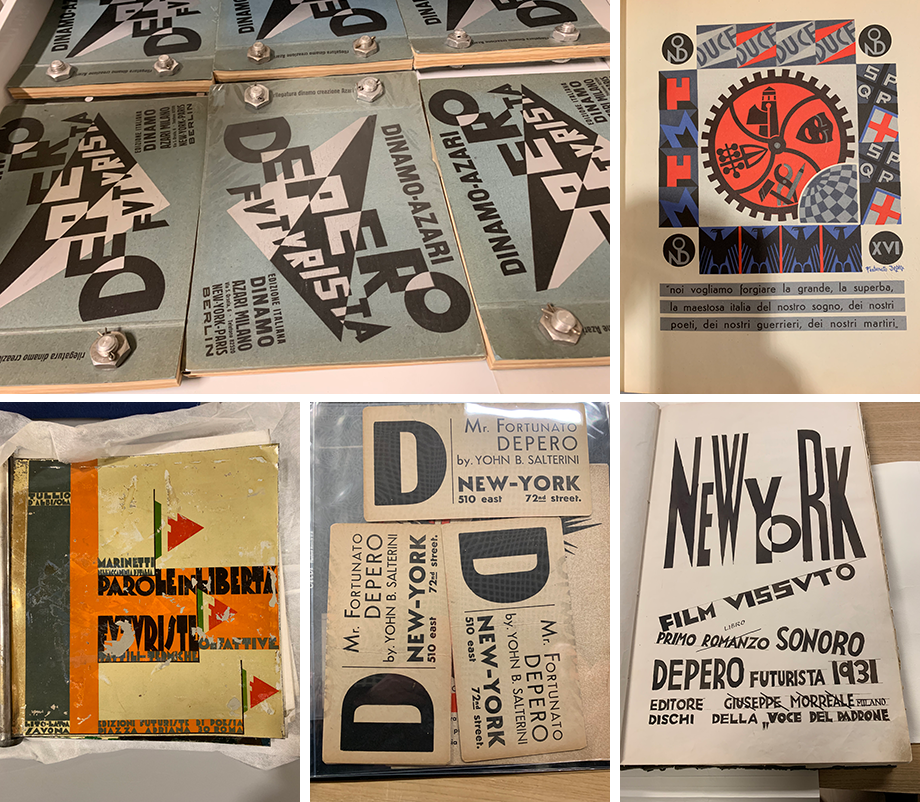
December 31, 2009
You Can’t Spell Italy Without Design
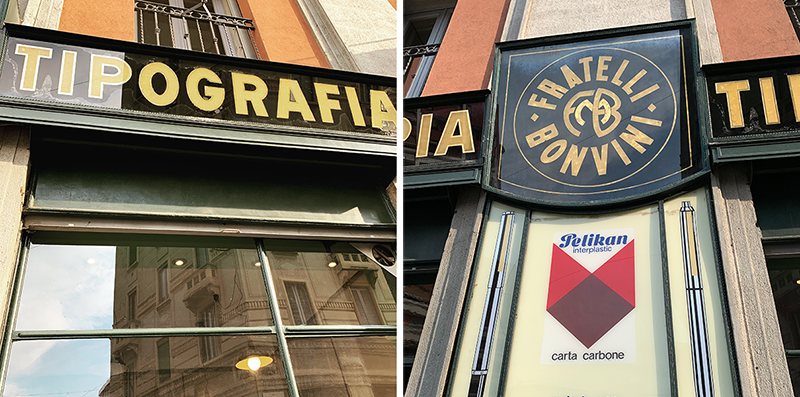
Fratelli Bonvini Cartoleria, Milano
Italy is one of the choicest graphic design cultures in all Europe. Wood type? It is here by the caseload. The kiss of metal type? It is passionate. The vibrating clatter of letter press? Heidelberg presses and Linotype machines play symphonic mechanical rhythms. Futurist impropriety and modernist rationalism? You will be immersed in its heritage. Esoteric letter lore and theoretical discourse. Hey, this is Italy, the home of epigraphic experts, modern design scholars and obsessed font connoisseurs. They’re all here keeping traditions alive, initiating experiments and preserving choice vintage treasures from the steam roller of progress. So, in short, if you yearn for this boot-shaped heaven on earth, maybe you’ll enjoy this brief reminiscence-cum-guide.
For over 35 years Louise Fili and I have made annual Italian pilgrimages (for the past ten years to teach in and co-chair respectively the School of Visual Arts Masters Summer Typography Workshop in Rome together with co-chair/founder Lita Talarico). This year, we sadly decided to suspend the Workshop, so Fili and I took a “busman’s holiday” for, among other reasons, to give a handful of lectures, commune with members of the design community and otherwise experience electric jolts of inspiration from Italy’s archives, libraries and museums that have long been on our short-list.
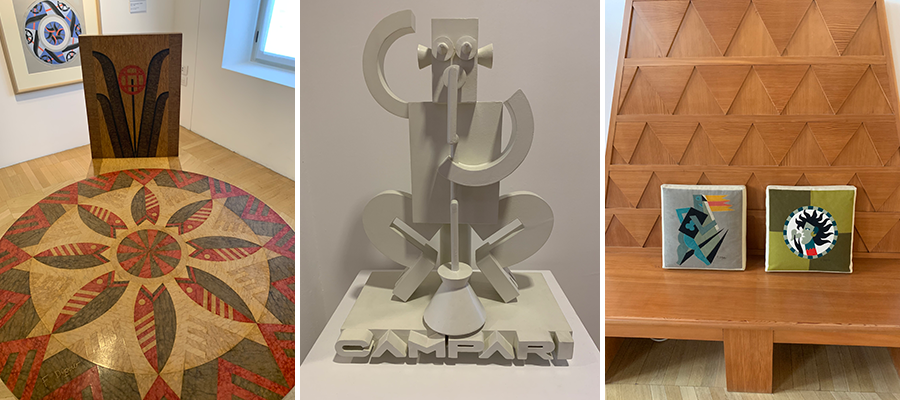
Exhibits from the Casa d’Arte Futurista Depero, Rovereto
Our itinerary included NABA (The Nuova Accademia di Belle Arti), MIMaster, Edizioni Corraini, Fondazione Mondadori and Bonvini in Milan; Casa d’Arte Futuristo Depero and MART in Rovereto; Anonima Impressori and Fondazione Cirulli in Bologna; The Kerning Conference in Faenza; and Gelateria Vivoli in Florence (Italy’s not Italy if you don’t have gelato! Vero?). Naturally, this is just a small portion of what Italy offers the designer, type and printing zealot — but for two weeks it is bellissimo!
If you have more time, you would be crazy not to visit Tipoteca in Cornuda: Not just a museum, Tipoteca, brilliantly directed by Sandro Berra, is also an archive, library, print shop, gallery and auditorium that offers visitors the chance to discover and experience the beauty of letterpress. Then don’t forget the Museo [Giambattista] Bodoni in Parma and the Archivio Tipografico in Torino. Rome, with its epigraphic collections and monuments, I’ll save for another day.
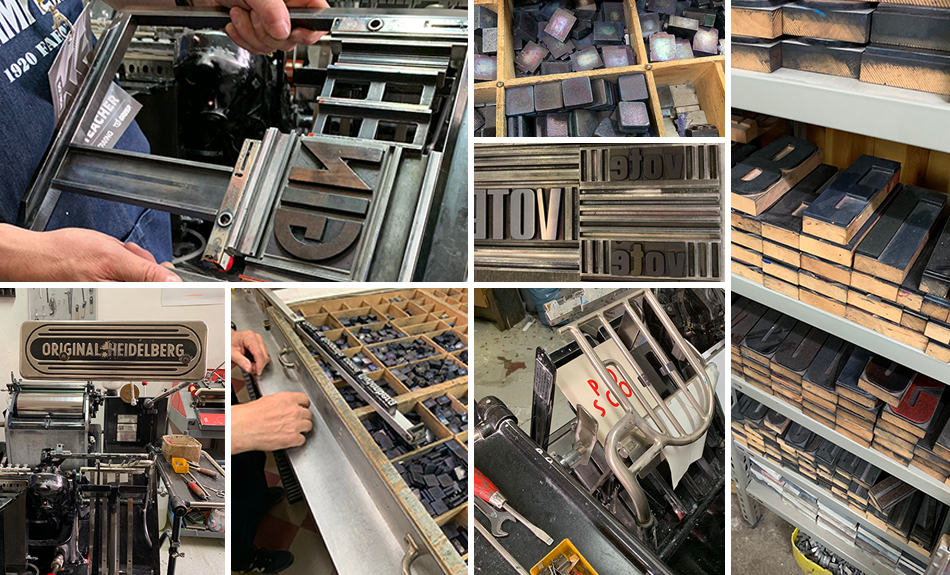
La Vecchia Stamperia, Faenza
So for now, let’s concentrate on this recent trip.
I was previously unaware of NABA, a privately launched, state-supported art/design school with an impressive campus (a former chemical laboratory). Years ago, graphic design was taught as a subset of architecture, today NABA’s design program (and others throughout Italy) is more inclusive, with emphasis on typography and design concept. At NABA its 3000 students are motivated by a solid faculty that includes practitioners and design historians, including the eminent scholar James Clough. With NABA future Italian designers are in good hands.
Another surprise, MIMaster is a unique illustration program accepting only 20 mature designers and artists per session. An intense six-month cohort focuses on a heavy battery of projects that anticipate editorial and book publishing trends. Weekly workshops with professional illustrators, designers, and art directors from around the world engage the students in their diverse disciplines. MIMaster, directed by Ivan Canu and Giacomo Benelli, collaborates with Fondazione Mondadori on lectures and exhibitions and produces illustration events at book fairs in Bologna, Shanghai, and at others.
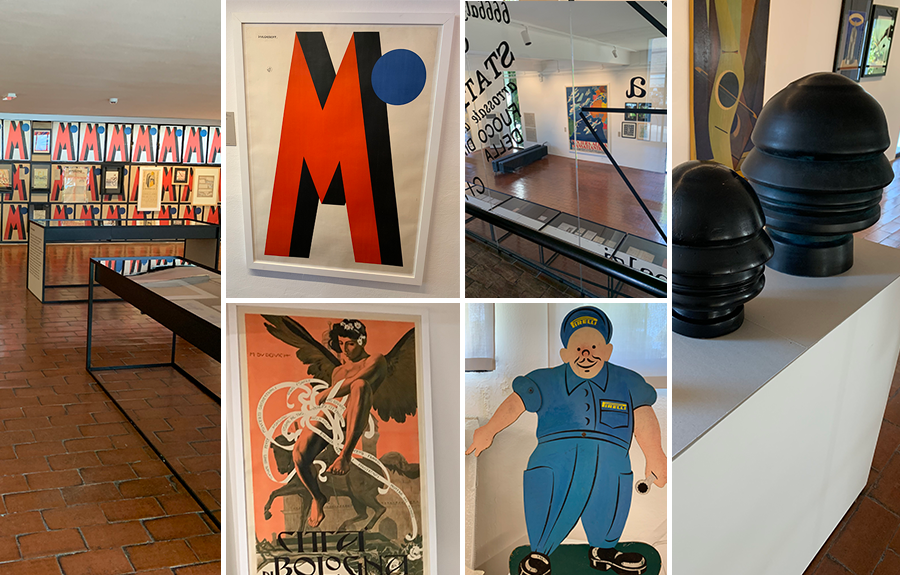
Massimo and Sonia Cirruli Fondazione, San Lazzaro di Savena
Another happy surprise, Fratelli Bonvini is a printing, book, and stationery business and typography/design gallery created in 2014 by a group of aficionados who refurbished the 100-year-old Milanese cartoleria and print shop, restoring all the original furniture and refurbishing the printing and binding equipment. Sold there are pencils and pens, albums and notebooks, nibs and inks, books and rubber-stamps, design and artists’ books and typographic specimens.
Edizioni Corraini, the leading independent design and illustrated book publisher and bookseller in Italy has outlets in Montova, Milan and Bologna. The publisher of all Bruno Munari’s books for adults and children, it prides itself on introducing new projects and reprints by veteran and young artists and designers. They also produce frequent lectures and presentations at Piccolo Teatro di Milano, where last year they opened a new retail shop/gallery.
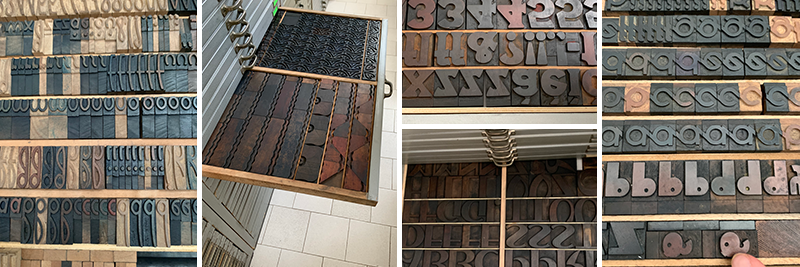
Anonima Impressori, Bologna
Next stop, we boarded two trains to Rovereto, surrounded by picturesque mountain ranges and tastefully rebuilt after heavy destruction during World War II. Interestingly, for such a small city (aprox. 36,000 people) it has a surfeit of museums, including the superb Casa d’Arte Futurista Depero. This eponymous museum contains Fortunato Depero’s prolific illustration, lettering, advertising, publication, textile, tapestry, furniture and more covering his periods as a Futurist in Italy and New York. In a special section of robust Futurist holdings at MART is the Depero Archive with all the work he donated to the city. The MART Futurismo Archive, generously assists scholars and researchers find their way through a wealth of primary material. If you ask, you can be shown through the basement, where a handful of volunteer veteran printers teach young wannabes how to print with letterpress. Among the hardware is an early film type machine and a Heidelberg that printed Depero’s famous “bolted book.” Our time was well spent in both venues with curators Duccio Dogheria and Frederico Zanoner, who guided us through troves of original documents.
From Rovereto we took an early train to Bologna, where we were treated to a double barrel of joy. First, a meeting with the four founders of Anonima Impressori, Luca Lattuga (an insatiable type and press collector), Veronica Bassini (a master printer), Barbara Orlandini and Massimo Pastore. Anonima is a spacious private print shop filled with multiple presses, countless drawers of Italian wood type located in an industrial area of the city. Last year, the group opened a small shop in central Bologna, where they offer printing demonstrations and sell their own entrepreneurial wares (books, games and cards).
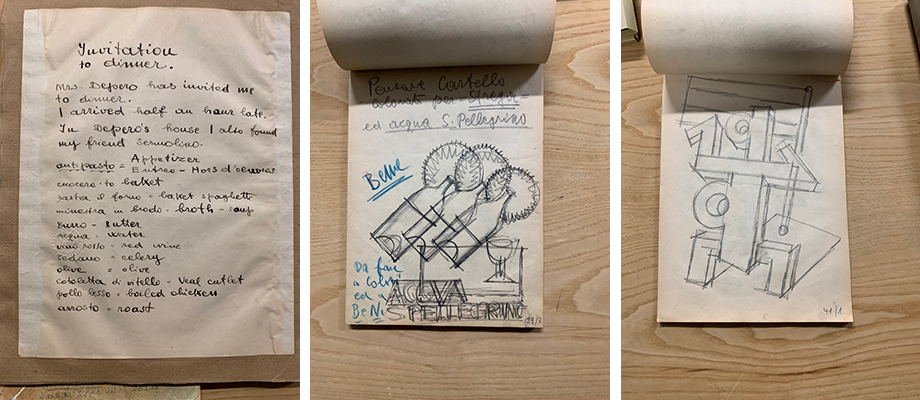
Sketches from the Depero Collection at MART Futurismo Archive
Our next visit was equally inspirational; located on the outskirts of Bologna in San Lazzaro di Savena is Massimo and Sonia Cirruli’s Fondazione Cirulli, a white modern symbol of modern Italian architecture. Designed in 1960 by architects and designers Achille and Pier Giacomo Castiglioni for Dino Gavina, the venue is strongly linked to the history of Italian design. The building interprets the rural architecture of barns and farms that today mark the Emilian landscape. On public view in the brightly designed two floor gallery is currently the “Universo Futurista” exhibition comprised of original posters, periodicals, drawings, sculptures and furniture. The bottom floor contains the archive with racks of rare and iconic posters and scores of flat files filled with the historic ephemera from many Italian businesses. The gregarious Massimo Cirruli, who mostly collects Italian design, plans to renovate a neighboring building in the same style to open as a study center replete with ten room dormitory for students and guest scholars. Suffice to say, his generosity and appetite for design is infectious.
After a brief interlude in Florence to see the current Salvatore Feragamo Museum exhibition on sustainable fabrics made from fruits and vegetables, we took a train to the Kerning Conference in Faenza, an annual event in the center of this sundrenched classic city features two days of workshops (June 5th and 6th) and a day of talks (June 7th). Kerning offers the chance to meet, in the organizers words, “developers, gurus, managers and innovators from all over the world.” We have met letterers, calligraphers, printers and type enthusiasts from Italy, Austria, Germany, Spain, and England and spent a special day hand composing wood type and printing in on a Heidelberg press at La Vecchia Stamperia, the historic Faenza workshop of Damiano Bandini (with the help of his semi-retired 85-year-old father).
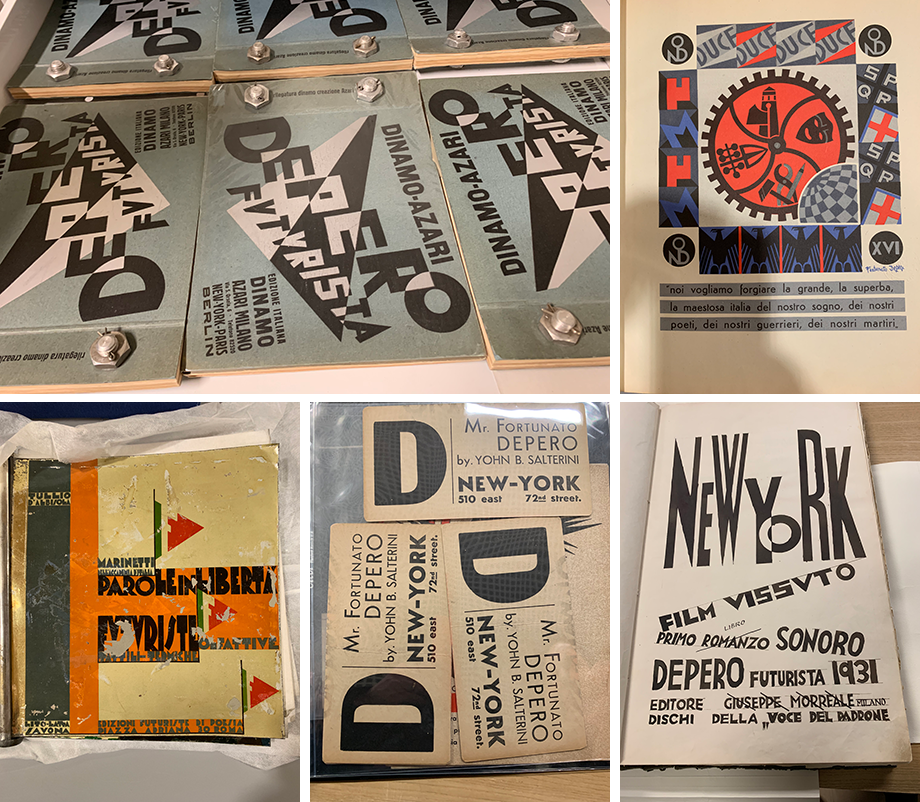
Books and ephemera from the Depero Collection at MART Futurismo Archive
Italy is not the world’s only type legacy wellspring but if you are a real graphic designer it is nothing short of Mecca. Or if you prefer a less spiritual description, just enjoy it for what it is: A remarkable — highly recommended — design adventure.
Observed
View all
Observed
By Steven Heller
Related Posts

Business
Courtney L. McCluney, PhD|Essays
Rest as reparations: reimagining how we invest in Black women entrepreneurs

Design Impact
Seher Anand|Essays
Food branding without borders: chai, culture, and the politics of packaging
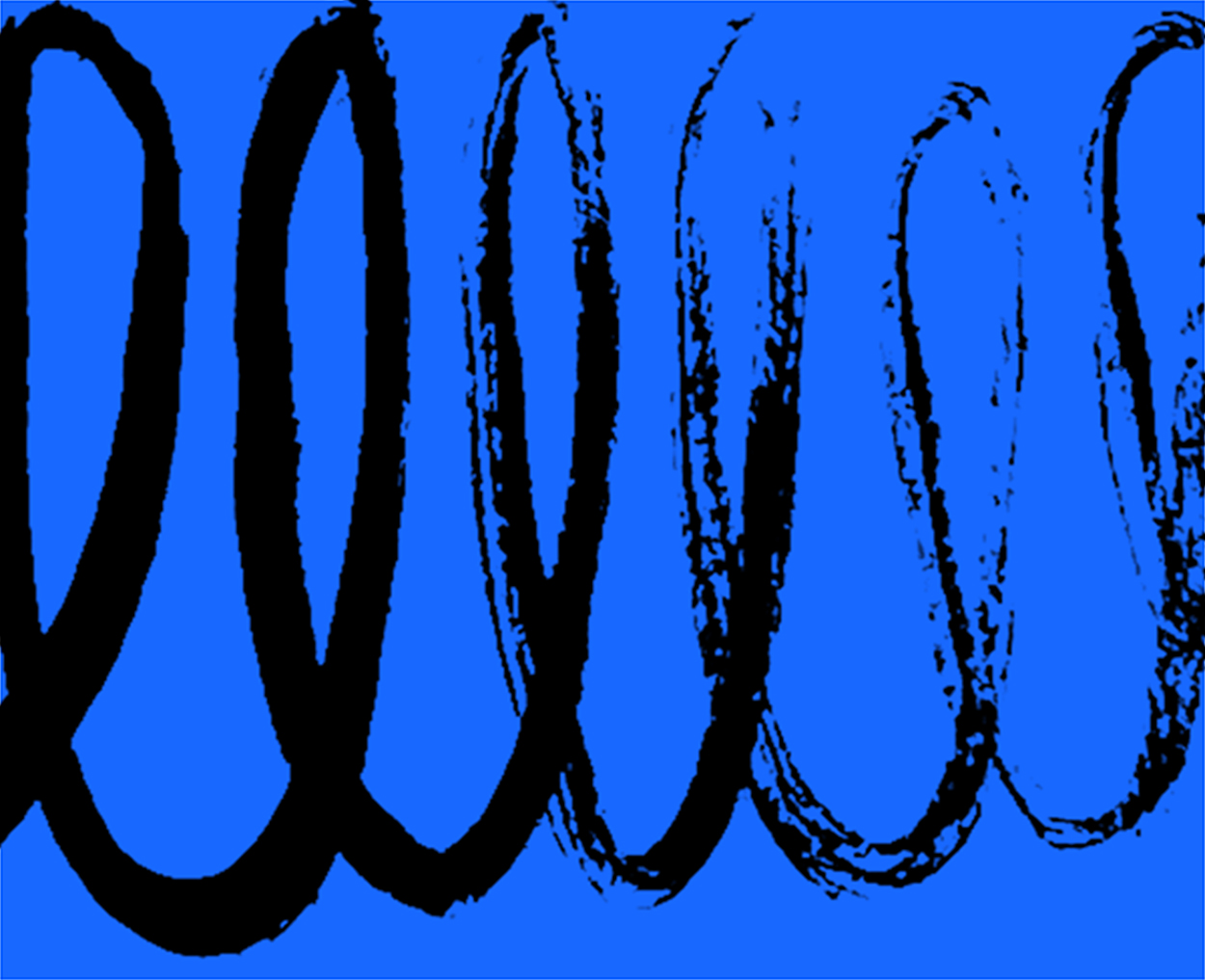
Graphic Design
Sarah Gephart|Essays
A new alphabet for a shared lived experience
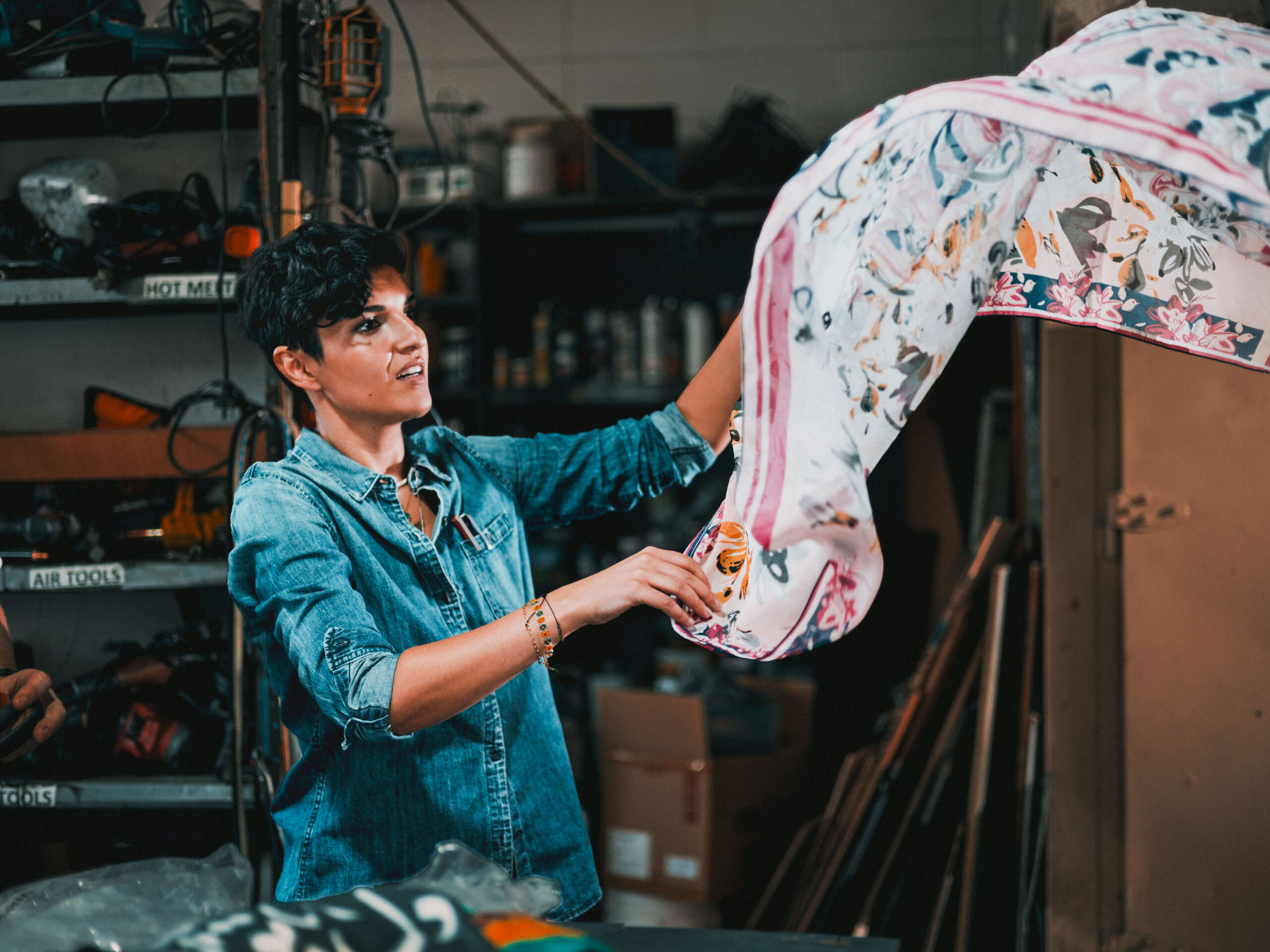
Arts + Culture
Nila Rezaei|Essays
“Dear mother, I made us a seat”: a Mother’s Day tribute to the women of Iran
Recent Posts
Minefields and maternity leave: why I fight a system that shuts out women and caregivers Candace Parker & Michael C. Bush on Purpose, Leadership and Meeting the MomentCourtney L. McCluney, PhD|Essays
Rest as reparations: reimagining how we invest in Black women entrepreneurs Food branding without borders: chai, culture, and the politics of packagingRelated Posts

Business
Courtney L. McCluney, PhD|Essays
Rest as reparations: reimagining how we invest in Black women entrepreneurs

Design Impact
Seher Anand|Essays
Food branding without borders: chai, culture, and the politics of packaging

Graphic Design
Sarah Gephart|Essays
A new alphabet for a shared lived experience

Arts + Culture
Nila Rezaei|Essays

 Steven Heller is the co-chair (with Lita Talarico) of the School of Visual Arts MFA Design / Designer as Author + Entrepreneur program and the SVA Masters Workshop in Rome. He writes the Visuals column for the New York Times Book Review,
Steven Heller is the co-chair (with Lita Talarico) of the School of Visual Arts MFA Design / Designer as Author + Entrepreneur program and the SVA Masters Workshop in Rome. He writes the Visuals column for the New York Times Book Review,